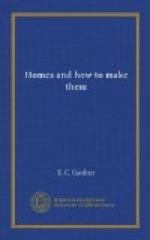The model house to which I alluded in beginning this subject will be, in brief, somewhat as follows: The outer walls will be vaulted, thoroughly non-conducting both of heat and of moisture. All the partitions will be of brick, precisely adapted in size to their use,—I am not sure but they will be hollow. The body of the floors will be of brick, supported, if need be, by iron ties or girders, all exactly fitted to the dimensions of the rooms, so that not a pound of material or an hour of labor shall be wasted on guess-work or in experiments. From turret to foundation-stone, the house will be a living, breathing, organic thing. If the weather prophet will declare what the average temperature of the winter is to be, we can tell to a hodful how much coal will maintain a summer heat throughout the establishment. You may be sure it will not be more than you now use in keeping two rooms uncomfortably hot and in baking the family pies. There will be no lathing, except occasionally on the ceilings; even this will not be necessary. You may make a holocaust of the contents of any room in the house, and, if the doors, finish, etc., happen to be of iron, as they may be, no one in the house will suspect your bonfire, until the heap of charcoal and ashes is found. Dampness and decay, unsavory odors and impure air, chilly bedrooms and cold floors, will be unknown. The ears in the walls will be stopped, there will be no settlement from shrinking timbers, no jelly-like trembling of the whole fabric when the master puts his foot down. Finally, the dear old house will be just as sound and just as lovely when the future John brings home his bride as when his grandsire built it. And it won’t cost a cent more than the weak, unstable things we’re raising by the thousand.
The coming house will surely be a brick one, but before it comes there will be plenty of work for the carpenters, and I shall not be at all surprised if you finally decide to build of wood.
LETTER XVI.
From Mrs. John.
Domestic discipline.
Mr. Architect: Dear Sir,—Yesterday afternoon Sister Jane and I went out after May-flowers. We didn’t find any, but on our way home met the schoolmaster, a friend of Jane’s, who knew where they grew and offered himself as a guide. I was too tired to walk any farther, so they went off without me. Coming into the house, I was taken all aback by the sight of John lying on my best lounge, his muddy boots on his feet, his hat on the floor, and your last letter crumpled savagely in his hand. I was vexed, thankful, and—frightened.




